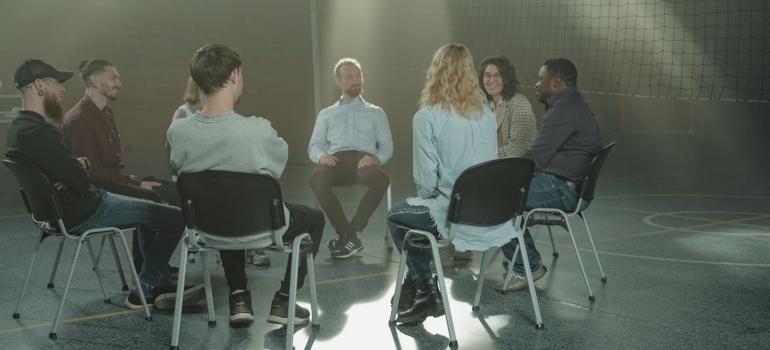Dual diagnosis treatment focuses on helping people who face both addiction and mental health challenges. These two issues often occur together, creating a cycle that can make recovery more difficult. Treating addiction and mental health together is necessary to help individuals achieve lasting recovery. At Harmony Ridge Recovery Center WV, experts understand the connection between addiction and mental health and provide the care needed to address both. By using a comprehensive approach, patients receive the support they need to rebuild their lives and find hope.
What Is Dual Diagnosis?
Dual diagnosis refers to a situation where someone has both a substance use disorder and a mental health condition. These disorders are connected, as one often worsens the other. For example, someone with anxiety might turn to alcohol to cope, leading to an alcohol addiction. Similarly, substance abuse can trigger or worsen mental health conditions like depression.

Treatment focuses on identifying and addressing both disorders. Professionals use methods like cognitive behavioral therapy for substance use disorders to help patients manage their thoughts and actions. These therapies teach individuals healthier coping methods, reducing the need for substances.
Signs of Dual Diagnosis
Here are common signs that someone may have a dual diagnosis:
- Struggling with mental health symptoms like anxiety or depression.
- Turning to drugs or alcohol to self-medicate.
- Difficulty maintaining relationships or meeting responsibilities.
- Experiencing frequent relapses despite seeking help.
Why Treating Addiction and Mental Health Together Is Necessary
Addiction and mental health disorders are closely connected. Focusing on only one problem often leaves the other untreated. This increases the risk of relapse or worsens mental health symptoms. Relapse rates are generally between 40% and 60% for drug use disorders. Treating addiction and mental health together gives patients a better chance of lasting recovery.
Professionals approach dual diagnosis carefully, and they treat addiction as a disease. This perspective helps remove blame and focuses on finding solutions. Addiction is not a moral failing but a condition that can be treated with the right support.
Integrated treatment also improves overall well-being. Addressing both issues at the same time allows patients to develop skills for managing triggers and stressors.
Therapies for Dual Diagnosis Treatment
Evidence-based therapies are proven methods for managing dual diagnosis. They include:
- Dialectical behavior therapy for addiction: Focuses on emotional regulation and stress management. This therapy is helpful for individuals dealing with intense emotions or trauma.
- Motivational interviewing for substance abuse: Encourages patients to find internal motivation to change. This method fosters a sense of ownership over recovery.
These therapies equip patients with tools to address the root causes of their struggles. They also help individuals build resilience for future challenges.

Individualized and Holistic Treatment
Each person’s experience with dual diagnosis is unique. That’s why individual therapy for addiction is important. These one-on-one sessions allow therapists to address specific concerns and create personalized strategies for recovery.
Many treatment programs also include holistic therapy for addiction. These therapies focus on overall well-being, incorporating practices like mindfulness, yoga, or art therapy. Holistic approaches reduce stress and promote healing by engaging the mind, body, and spirit.
The Role of Psychotherapy in Treating Addiction and Mental Health Together
Psychotherapy plays an important part in dual diagnosis treatment. It helps individuals understand how their mental health challenges and substance use disorder are connected. By providing a safe and supportive environment, psychotherapy allows patients to explore their emotions, thoughts, and behaviors that may contribute to their struggles. This approach uncovers deeper issues that may have led to their addiction and offers solutions for managing them effectively.
Psychotherapy for addiction often involves several types of therapy that work together to help patients:
- Cognitive behavioral therapy: Patients learn to identify and change unhealthy thought patterns that trigger substance use. This therapy equips them with practical tools for managing stress, triggers, and negative emotions.
- Group therapy: Patients interact with others facing similar struggles. Sharing experiences fosters a sense of connection and mutual understanding, which can make recovery feel less isolating.
- Trauma-focused therapy: This method addresses unresolved trauma that may be contributing to addiction and mental health challenges.
- Specialized therapies for substance-specific challenges: Such as benzo addiction treatment, address unique withdrawal symptoms and triggers for benzodiazepine dependency.
Psychotherapy doesn’t stop at addressing current issues; it also builds skills for long-term recovery. When combined with other treatments like medication or holistic methods, psychotherapy provides a well-rounded approach to treating addiction and mental health together.

Challenges in Treating Dual Diagnosis
Treating dual diagnosis can be complex due to the interconnected nature of mental health disorders and substance use. Here are the primary challenges involved:
- Difficulty in Diagnosis: Symptoms of one disorder may overlap or mask the other, making it challenging to identify both conditions accurately. For instance, substance withdrawal symptoms may resemble mental health issues like depression or anxiety.
- Stigma: Many individuals hesitate to seek treatment because they fear being judged or misunderstood. This stigma can delay treatment and worsen both conditions over time.
- Treatment Resistance: Some patients may struggle to accept the need for dual diagnosis treatment, either due to denial about their mental health condition or their addiction.
- Relapse Risk: If one condition is left untreated or inadequately managed, the chances of relapse significantly increase. For example, untreated mental health symptoms may trigger substance use as a coping mechanism.
- Complex Treatment Plans: Dual diagnosis requires a combination of therapies, medications, and support systems. Balancing these elements while addressing each patient’s unique needs can be demanding.
Facilities like Harmony Ridge Recovery Center WV specialize in navigating these challenges, providing comprehensive care that addresses the unique aspects of dual diagnosis and supports patients on their journey to recovery.
Holistic Therapy: Addressing the Whole Person
Dual diagnosis treatment isn’t solely about addressing the mental and emotional aspects of a person’s struggles—it’s about treating the whole individual. Holistic therapy for addiction is an approach that considers all parts of a person’s well-being, including the mind, body, and spirit. These therapies provide a unique opportunity for individuals to explore new ways of coping with stress and to reconnect with themselves in meaningful ways.
Holistic therapies are particularly valuable because they work alongside traditional evidence-based approaches, enhancing their impact. By addressing areas like physical health, emotional balance, and creative expression, holistic practices offer tools that traditional therapies alone might not provide. For example, a person recovering from substance use may find that practicing mindfulness helps reduce cravings by teaching them to focus on the present moment rather than dwelling on past regrets or future worries. Examples of holistic therapies in dual diagnosis treatment:
- Mindfulness practices: These encourage individuals to observe their thoughts and feelings without judgment. Patients often report feeling more grounded and less reactive to triggers.
- Yoga: Combines physical activity with relaxation, helping to ease tension in the body while fostering mental clarity. For many, yoga becomes a sustainable practice that promotes overall health and inner peace.
- Art therapy: Allows individuals to express emotions they may struggle to articulate verbally. Painting, drawing, or creating music can provide a sense of release and accomplishment.
- Outdoor activities: Spending time in nature has been shown to improve mental health. Activities like hiking or gardening can be incredibly therapeutic.

The Importance of Family Support in Recovery
Family is one of the most important parts of the recovery process. When someone struggles with both addiction and mental health challenges, their family is often affected as well. Relationships may become strained, communication may break down, and trust may be lost. However, families also have the power to provide the encouragement and stability their loved ones need to heal.
A strong family support system can significantly improve treatment outcomes. Family members can serve as a source of motivation, helping individuals stay on track during their recovery journey. By understanding what their loved one is going through and offering nonjudgmental support, families can help reduce feelings of isolation and stigma.
At Harmony Ridge Recovery Center WV, family therapy sessions play a major role in recovery. These sessions create a space for open communication, where family members can discuss their concerns and learn about the challenges of dual diagnosis. Therapists guide families in rebuilding trust and setting healthy boundaries, which are important for long-term success.
Ways Families Can Support Recovery
Families help their loved ones heal and strengthen their relationships by participating in the recovery journey. Recovery is a team effort, and when families work together, the chances of long-term success are much higher. Families can:
- Educate themselves: Learning about dual diagnosis helps family members better understand their loved one’s experiences.
- Encourage treatment: Supporting attendance at therapy and group sessions shows a commitment to recovery.
- Practice patience: Recovery is a process that takes time. Showing patience and compassion can make a big difference.
- Focus on self-care: Families should also take care of their own mental and emotional health to remain strong and supportive.
Building Long-Term Recovery Skills
Recovery doesn’t end when a treatment program is completed—it’s a lifelong process that requires continuous effort. For individuals with a dual diagnosis, learning skills to maintain sobriety and mental health is just as important as the treatment itself. These skills help individuals navigate challenges, manage triggers, and build a fulfilling life free from addiction.

Healthy Lifestyle Changes
Making small, manageable changes can have a significant impact on recovery. These include:
- Eating nutritious meals: Proper nutrition supports physical and mental health, boosting energy levels and mood.
- Exercising regularly: Physical activity reduces stress, improves sleep, and releases endorphins, which help regulate emotions.
- Maintaining a consistent sleep schedule: Quality sleep is essential for emotional balance and decision-making.
These habits provide structure and a sense of stability, which are especially important during the early stages of recovery.
Developing Coping Strategies
Managing stress and triggers is a key part of long-term recovery. Patients are encouraged to adopt coping strategies that fit their needs, such as:
- Mindfulness practices: Techniques like meditation or deep breathing help individuals stay present and calm during stressful situations.
- Therapy continuation: Ongoing sessions with a therapist provide a safe space to discuss challenges and gain new insights.
- Creating a support network: Building relationships with others in recovery offers encouragement and accountability.
Finding Purpose Through Community Involvement
Engaging in activities that foster a sense of purpose can be transformative. This might involve joining local support groups, volunteering, or pursuing hobbies that bring joy and fulfillment. Community involvement not only strengthens self-esteem but also helps individuals focus on their future rather than dwelling on past struggles.
At Harmony Ridge Recovery Center WV, patients are equipped with the tools they need to create a stable and rewarding life after treatment. The center’s programs emphasize the importance of ongoing growth, helping individuals remain resilient as they navigate the ups and downs of recovery.
By focusing on lifestyle improvements, emotional resilience, and meaningful connections, individuals can build a foundation for lasting success in both sobriety and mental health.
Success Stories: Proof That Recovery Works
Dual-diagnosis treatment has changed countless lives. At Harmony Ridge Recovery Center, patients who once struggled with addiction and mental health issues have found hope and healing.

One patient, for example, struggled with anxiety and alcohol addiction. Through a combination of cognitive behavioral therapy for substance use disorders and motivational interviewing for substance abuse, they learned how to manage their anxiety without relying on alcohol. Another patient used holistic therapy for addiction to reconnect with themselves emotionally and physically, achieving a balance they never thought possible.
These stories remind us of the power of treating addiction and mental health together.
Building a Brighter Future: Treating Addiction and Mental Health Together
Dual-diagnosis treatment addresses the complex relationship between addiction and mental health disorders. By treating addiction as a disease and using evidence-based therapies, patients can find a path to recovery. At Harmony Ridge Recovery Center, integrated care ensures both conditions are treated together, offering a higher chance of long-term success. Whether through psychotherapy, holistic methods, or family support, treating addiction and mental health together is the most effective way to help individuals regain control of their lives. If you or someone you know needs help, reach out today to start the journey toward healing.
Reference:



